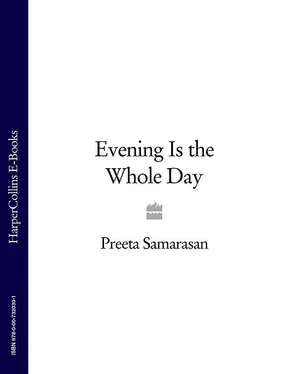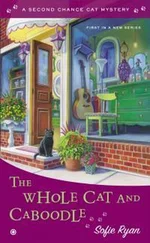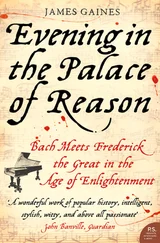It was Suresh who penned these two inspired lines on the inside cover of his science textbook. He was nine years old at the time, and he entertained the idea of sharing the couplet with Appa, who would surely roar with laughter and pat him on the shoulder (if they were standing up) or the knee (if they were sitting down), the way he laughed and patted Uma whenever she displayed a wit worthy of her genes. But in the days after Suresh composed the verse Appa was hardly ever at home, and when he was his mood was so uneven that after three weeks of waiting, Suresh scratched the lines out with a marker pen to avoid trouble in case of a spot check by the school prefects.
“Going home it seems,” Appa would snort, recalling Mr. McDougall’s final words to Tata. “That’s what McDougall told them. What nonsense! His home, maybe, not theirs. Their skin may have been white but they were Chinks through and through, let me tell you.” Chink was a small, sharp sound that made Amma suck her teeth and shake her head, but this only encouraged Appa. “Probably wandering the moors looking for pork-entrail porridge,” he’d go on. “Wiping their backsides with the Nanyang Siang Pau ’s business pages. Shipped specially to them by courier service.”
Then Uma would giggle, and Suresh, watching her, would giggle with equal intensity, a number of giggles empirically guaranteed to flatter Appa without risking a mouthslap or a thighpinch from Amma. Only Aasha never joined in, for amusing as she found Appa’s portraits of the McDougall children, her heart was with the little drowned girl, who wore her hair in pigtails; who had eyes like longan seeds and lychee-colored cheeks; who sometimes, on close, moonless nights, begged to be let in at the dining room window. Please , she mouthed to Aasha, can’t I sit at the table in my father’s house?
Don’t talk rubbish, Appa and Amma and Uma and Suresh said when Aasha told them. And when once she opened that window, she got a slap on the wrist for letting in a cicada.
WHEN MR. MCDOUGALL fled to the Scottish Highlands, it had been nine years since King George VI had relinquished the cherished jewel of his crown. To be more precise: he’d dropped it as if it were a hot potato, towards the outstretched hands of a little brown man in a loincloth and granny glasses; a taller, hook-nosed chap in a still-unnamed jacket; and three hundred and fifty million anonymous Natives who’d fiercely stayed up until, by midnight, they’d been watery-eyed, delirious with exhaustion, and willing to see nearly anything as a precious gift from His Majesty. Down, down, down it had fallen, this crown jewel, this hot potato, this quivering, unhatched egg, none of them knowing what would emerge from it and yet most of them sure—oh blessed, blissful certainty!—that it was just what they wanted. Alas, the rest, too, is history: in their hand-clapping delight they’d dropped it, and it had broken in two, and out of the two halves had scurried not the propitious golden chick they’d imagined, but a thousand bloodthirsty monsters multiplying before their eyes, and scrabble as they might to unscramble the mess, it was too late, all too late even for them to make a last-minute omelet with their broken egg.
Now, in 1956, a slip of a nation just across the water prepared to lower the Union Jack forever, convinced (and correct, in a way) that here things would be different. This land awakened, shook out its hair, and readied itself for a decade of casting off and putting on names as if they were festive raiments. The Federation of Malay States. Malaya. Malaysia. Before another crowd of breathless, bright-eyed Natives, another Father of another Nation cleared his throat. Tunku Abdul Rahman, Oxbridge-educated, like so many new Fathers. Fond of his Yorkshire pudding and his steak and kidney pie with lashings of gravy. But bravely he cast these from his mind (or tried to), exchanged his morning coat for a baju melayu whose rich gold threads chafed his skin, and rose, adjusting his tengkolok on his head, to lead his people from their paddy fields, their family plantations, and their one-room school-huts to a new age of glory. They’d never had Yorkshire pudding or steak and kidney pie, but they trusted him: in his veins ran good Malay blood, and that, they believed, could not be diluted by any amount of bad English food.
Mr. McDougall knew the people of Malaya all too well; he’d helped to create them, after all, he and his fellow settlers. They’d brought the Chinese and the Indians out here on lurching boats for their brains and their brawn, for the raking in of taxable tin profits and the slaving under the midday sun. Like God, Mr. McDougall and his compatriots had watched their word take miraculous material form, Malay and Chinese and Indian stepping up unquestioningly to fill the roles invented for them. The Malay peasant sloshing about halfheartedly for a few hours a morning in the rice paddies of his divinely ordained destiny, content the rest of the day to squat in the shade under his hut-on-stilts. The Chinese coolie sniffing his diligent way to tin and opium. The indentured Indian, so high on betel juice that he could dig ditches for twelve hours, happy as a water buffalo in mud, burning his brown skin black under the sun and shuffling home at night to drink cheap toddy and beat his wife. For seventy years they’d all lived in harmony with the white men who ran the country, but for a few isolated incidents: a governor stabbed while he bathed, a ragtag protest. On the whole, things had gone according to plan.
Mr. McDougall couldn’t say with any certainty when it had all begun to change, but he’d taken notice when the Chosen Few had started to get too big for their boots. That’s what he and his chums at the miners’ club had called the boys His Majesty’s government had been specially grooming for the Malay Administrative Service and God only knew what else. Those scrubbed little weasels, schooled at the Malay College or the Victoria Institution or the Penang Free School and shipped off to Oxford and Cambridge to keep the Natives happy. For a while a pat on the head here and a promotion there had been enough to keep them going when they got home, but even then he had smelled trouble coming, seeing them return in their robes and powdered wigs. This Tunku chap was the worst of that lot. Before Mr. McDougall had time to say I told you so, the boys from the Malay College had begun to rouse the rabble. Them on one side, and on the other the bloody Chinese communists, wretched turncoats: the very weapons the British had given them to fight the Japanese were now being used to murder Briton and Native alike.
King George was gone. His daughter now wore his plucked crown: above her solid English face it sat, with a large hen’s egg of a hole smack above her forehead, a pair of smaller round holes to the left, and to the right a row of tiny emeralds and rubies, loose as a seven-year-old’s milk teeth, waiting to be knocked out.
It was precisely because Mr. McDougall knew the Tunku’s people so well that he saw what would hatch from this latest little jewel-egg: nothing but the same old kind of trouble that had swamped India and Burma and the Sudan. Shifting their weight from foot to worried foot, their eyes glittering like wolves’ in the dark, the Chinese and the Indians were already waiting on the sidelines. That was to say, those who hadn’t already joined the communists, whose “insurgency”—Mr. McDougall chuckled bitterly every time he heard this namby-pamby word—they’d be lucky to put down before they left. Oh yes, no doubt about it, this was going to be a circus, a zoo, and a Christmas pantomime all rolled into one.
What with his mistress raving and raging at his heels, threatening to bring the outside world’s insanity into his high-ceilinged house, Mr. McDougall wasn’t wasting any time. On the fifteenth of December 1956 he had his lawyer draw up the bill of sale for the house and its adjoining acres, coconut trees and all; on the eighteenth he broke camp and headed home to Scotland, resigned to the prospect of spending a puking Yuletide on the high seas. He’d sold the house at a loss, but he didn’t care, not even when he saw the self-satisfied glint in the eyes of the wog who bought it. This man was a walking symptom of the softening of the empire. When a dockyard coolie could send his son to Oxford, thought Mr. McDougall as he signed his half of the unevenly typewritten, smudgily cyclostyled contract, that’s when you knew it was time to cut your losses and flee. The Rise of the Middle Bloody Class all right. That’s all we need .
Читать дальше












